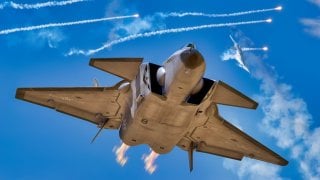Taiwan: Not “Unfinished Business,” But a Fight for Democracy’s Survival
Taiwan will be a critical test of the global community’s willingness to defend a vibrant democracy against China's authoritarian expansionism.
In a recent special report on CNN, “Taiwan: Unfinished Business,” host Fareed Zakaria presented an in-depth reading of the dire stakes across the Taiwan Strait. Covering the history, motivations, and realities of the situation, he aptly noted that complexities between Taiwan and China must “be managed rather than solved.” Any mishandling of tensions, he notes, may veer competition into conflict, with unbearable consequences for all involved.
However, his policy prescriptions miss the mark. To start, he fails to attribute responsibility for present realities across the Taiwan Strait, risking false equivalence between the major stakeholders: China, the United States, and Taiwan. Of the three, only one seeks to change the status quo—a foundation for peace and stability across the Taiwan Strait. Under Xi Jinping—the most powerful Chinese leader since Mao Zedong—Beijing seeks to resolve its “Taiwan question” with greater urgency and impetus.
These actions are seen and felt on the streets of Taipei. People’s Liberation Army fighter jets cross the median line of the Taiwan Strait with regularity—including fourteen aircraft just last week—heightening risks of flare-ups and accidents. PLA navy vessels operate in startling proximity to Taiwan’s coastline. Large-scale military exercises took place after Taiwan’s presidential elections in January. Recently, China’s diplomatic isolation campaign also bore fruit when one of Taiwan’s dwindling number of Pacific allies, Nauru, switched recognition to Beijing.
It’s tempting to see these actions as indicative of deteriorating cross-strait relations, with responsibility shared across all parties. However, a closer look reveals a clear pattern of escalatory behavior coming solely from Beijing, designed to undermine peace across the Taiwan Strait, disrupt a rules-based international order, and present the concept of unification as inevitable for the people of Taiwan. In this case, there is no equivalence as the PRC has made its intentions clear—unification must be prioritized above all else. Peace no longer appears to be on the agenda.
These themes are alluded to within the CNN report, which presents the context of the Chinese Communist Party’s ideas of historical legacy and national identity. Yet, the conclusions reached oversimplify what is and will remain a complex situation. While it may be easy to claim that all “three sides should keep talking,” this statement fails to reflect realities that since 2016, the PRC has cut off channels of communication with Taiwan’s democratically elected government, despite Washington and Taipei’s efforts to the contrary.
Similarly, a point on avoiding provocations fails to note that Beijing has a growing tendency to attach this label to all actions taken supporting Taiwan, including congressional visits and arms procurements that have been routine since the 1970s. These are the nuances required to capture the intricacies of the issue. All of this is necessary as we think about real-world prescriptions that would contribute meaningfully to peace and stability across the Taiwan Strait.
To be clear, none of this detracts from Taiwan’s agency in this critical situation. Over the past eight years, President Tsai Ing-wen has balanced efforts to strengthen Taiwan’s security while avoiding actions that could inflame tensions across the Taiwan Strait. President-elect Lai Ching-te has vowed to do the same: maintain the cross-strait status quo while enhancing global partnerships and building defense deterrence. Both have made clear that Taiwan must be an active contributor to peace in the region.
China cannot say the same. Under the leadership of Xi Jinping, Beijing is increasingly becoming a revisionist power willing to challenge the cross-strait status quo. More worryingly, it does so amid a global competition between authoritarian tendencies and democratic values. The war in Ukraine has already shown the fragility of international peace. Consequently, countries should no longer be wishful in terms of their conceptualizations of peace but realistic in the haste and scope of their actions.
Taiwan will be a critical test of the global community’s willingness to defend a vibrant democracy against authoritarian expansionism. It will be indicative of whether the global community can work together to avert a disaster of catastrophic proportions—one that would leave no corner of the world untouched. To do so, the issue must be “managed very carefully,” as Zakaria points out. But at the same time, we must also be clear-eyed in calling out irresponsible actors as they emerge—for to do so otherwise would be a disservice to our shared pursuit of peace.
About the Author
Vincent Chao served as the foreign policy adviser for President-elect Lai Ching-te and was recently the head of international affairs at the Democratic Progressive Party.
Image: Shutterstock.


